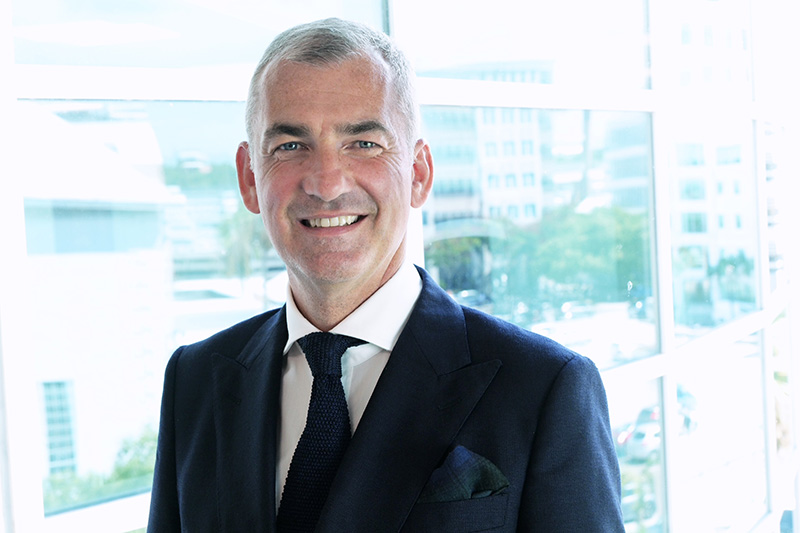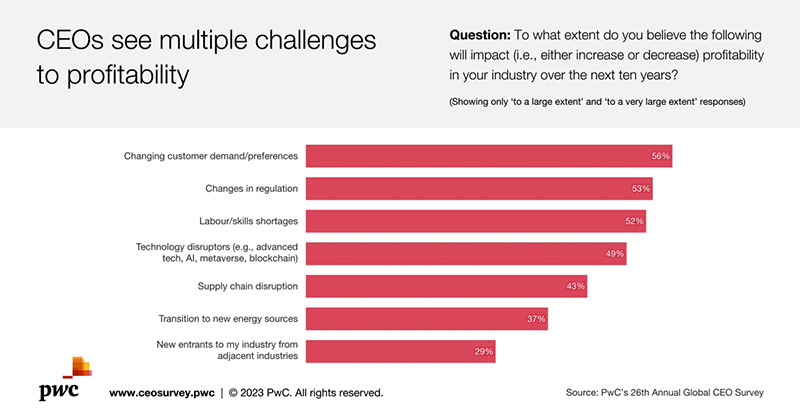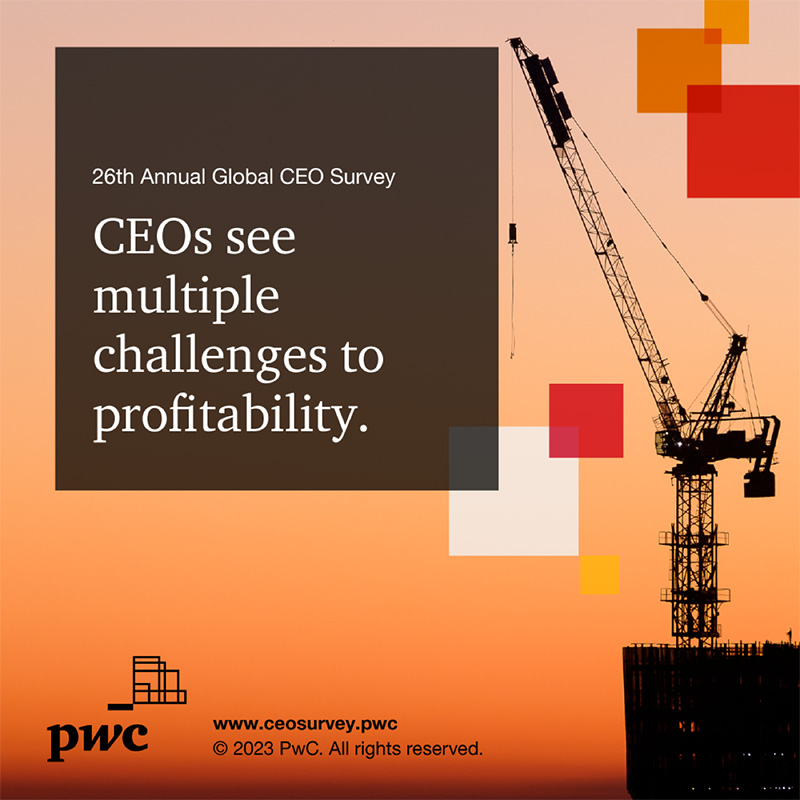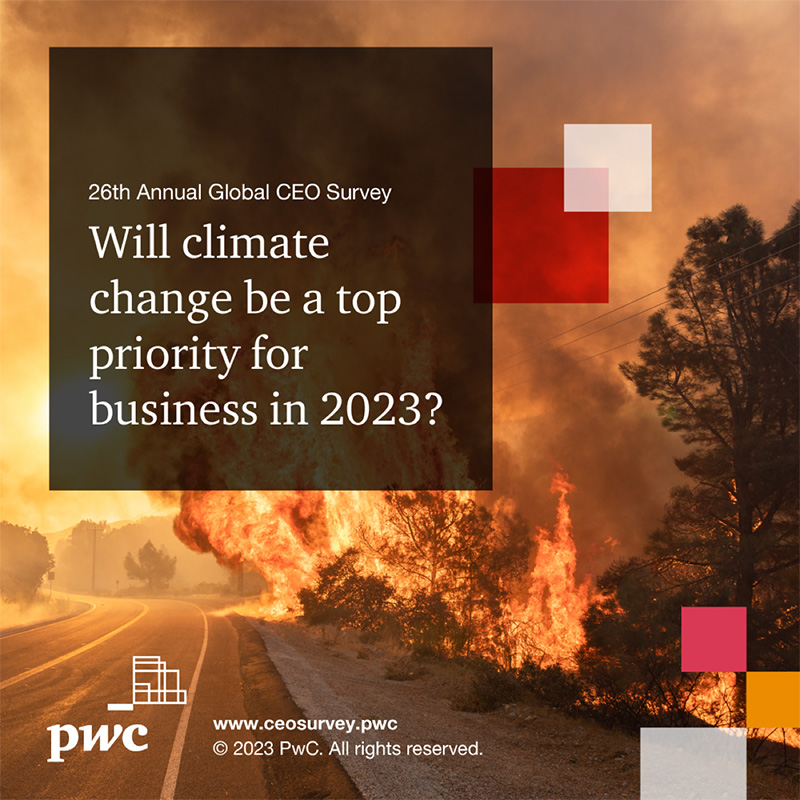Survey: 73% Believe Global Growth Will Decline
Nearly three quarters [73%] of CEOs believe global economic growth will decline over the next 12 months, according to PwC’s 26th Annual Global CEO Survey, which polled 4,410 CEOs in 105 countries and territories, including Bermuda and in the Caribbean region, in October and November 2022.
A spokesperson said, “The bleak CEO outlook is the most pessimistic CEOs have been regarding global economic growth since PwC began asking this question 12 years ago and is a significant departure from the optimistic outlooks of 2021 and 2022, when more than two-thirds [76% and 77%, respectively] thought economic growth would improve.
“In addition to a challenging environment, nearly 40% of CEOs think their organisations will not be economically viable in a decade if they continue on their current path. The pattern is consistent across a range of sectors, including insurance [37%], telecommunications [46%], manufacturing [43%], healthcare [42%] and technology [41%]. CEO confidence in their own company’s growth prospects also declined dramatically since last year [-26%], the biggest drop since the 2008-2009 financial crisis when a 58% decline was recorded.”
Arthur Wightman, PwC Bermuda territory and Insurance leader, said: “We are seeing a level of pessimism among CEOs not seen in over a decade. The risks facing organisations, people and our planet are relentless.
The spokesperson said, “Consequently, CEOs globally and here in Bermuda are re-evaluating their operating models and reducing costs. If organisations are to survive the next few years – they must carefully balance the dual imperative of mitigating short-term risks and operational demands with long-term outcomes. CEOs face an incredible challenge to reinvent the business for the future, but also an opportunity to lead with purpose, be a catalyst of innovation, and help solve important societal problems.”
“CEOs are seeing multiple direct challenges to profitability within their own industries over the next 10-years. More than half [56%] believe changing customer demand/preferences will impact profitability, followed by changes in regulation [53%], labour/skills shortages [52%], and technology disruptions [49%].
“Financial services CEOs cite regulatory change [66%] as their biggest potential source of industry disruption, followed by evolving customer preferences [61%], technology shifts [59%] and labour/skills shortages [48%].”
Top risks: Inflation, macroeconomic volatility and geopolitical conflict top CEOs’ concerns
The spokesperson said, “While cyber and health risks were the top concerns a year ago, the impact of the economic downturn is top-of-mind for CEOs this year, with inflation [40%] and macroeconomic volatility [31%] leading the risks weighing on CEOs in the short-term – the next 12 months – and over the next five years. Close behind, 25% of CEOs also feel financially exposed to geopolitical conflict risks, whereas cyber risks [20%] and climate change [14%] have fallen in relative terms. Financial Services CEOs feel similarly exposed to a diverse set of risks. Over the next 5 years, economic volatility [34%], cyber risks [33%], and inflation [30%] were of most concern, while geopolitical conflict [25%] and climate change [22%] were of slightly lower concern. Over the next 12 months, FS executives feel more exposed to inflation [43%], economic volatility [40%], and cyber risks [27%].
“The war in Ukraine and growing concern about geopolitical flashpoints in other parts of the world have caused CEOs to rethink aspects of their business models. To mitigate exposure, companies are increasing their investments in cybersecurity or data privacy, adapting supply chains, and adjusting their geographic footprint.”
Managing climate risk
The spokesperson said, “Climate risk did not feature as prominently as a short-term risk over the next 12-months relative to other global risks. This was the case as well in the insurance sector where CEOs ranked it as the fourth biggest risk they face over the next 12 months, while inflation was number one. Over the next five years, climate change increases as a threat for CEOs – and becomes the top threat for Caribbean CEOs [40%].
“CEOs across all industries see climate risk impacting their cost profiles [50%], supply chains [42%] and physical assets [24%] from a moderate to very large extent. CEOs in the Caribbean feel particularly exposed, with 68% seeing the potential for impacting their cost profiles, 58% to supply chains, and 38% to physical assets.
“Recognising the impact climate change will have on business and society over the long-term, a majority of CEOs have already implemented – or are in the process of implementing – initiatives to reduce their companies’ emissions [65%], in addition to innovating new, climate-friendly products and processes [61%], or developing data-driven, enterprise-level strategy for reducing emissions and mitigating climate risks [58%].”
Arthur Wightman said: “Combating climate change requires a coordinated, long-term plan. It won’t be solved if the only companies working on it are those that face immediate financial impact. Bermuda’s insurers have a substantial opportunity to increase global resilience, however, success at driving climate risk innovation depends on whether there is the appetite to tackle accelerating problems being caused by climate change.”
CEOs are cutting costs but not headcount or compensation
The spokesperson said, “In response to the current economic climate, CEOs are looking to cut costs and spur revenue growth. 52% of CEOs report reducing operating costs, while 51% report raising prices and 48% diversifying product and service offerings. However, more than half – 60% – say they do not plan to reduce the size of their workforce in the next 12 months. A vast majority – 80% – indicate they do not plan to reduce staff remuneration in order to retain talent and mitigate workforce attrition rates.”
The continued importance of trust and transformation in generating long-term value
The spokesperson said, “CEOs noted the need to collaborate with a wide range of stakeholders to build trust and deliver sustained outcomes if they are to generate long-term societal value. The survey found that when organisations partner with non-business entities, it is to address sustainable development [54%], diversity, equity, and inclusion [49%], and education [49%].
“If organisations are to remain viable in the near and long-term, they must also invest in their people and technological transformation agendas to empower their workforces. Technologically, nearly two-thirds [76%] of organisations say they are investing in automating processes and systems, implementing systems to upskill workforces in priority areas [72%], deploying technology such as the cloud, AI and other advanced technology [69%].
“However, many CEOs question whether critical preconditions for organisational empowerment and entrepreneurship – such as alignment to company values and leaders’ encouragement of dissent and debate –are present in their companies to tackle the increasingly complex risks organisations face. For example, only 23% of CEOs say leaders in their company often/usually make strategic decisions for their function without consulting the CEO. Further, only 46% of CEOs say leaders in their company tolerate small scale failures often/usually. However, more optimistically, nearly 9 in 10 [85%] respondents say the behaviours of employees are often or usually aligned with their companies’ values and direction.
“Torn between the demands of short-termism and long-term transformation, CEOs say they are primarily consumed with driving current operating performance [53%], rather than evolving the business and its strategy to meet future demands [47%]. If they could redesign their schedules, CEOs say they would spend more time on the latter [57%].”






